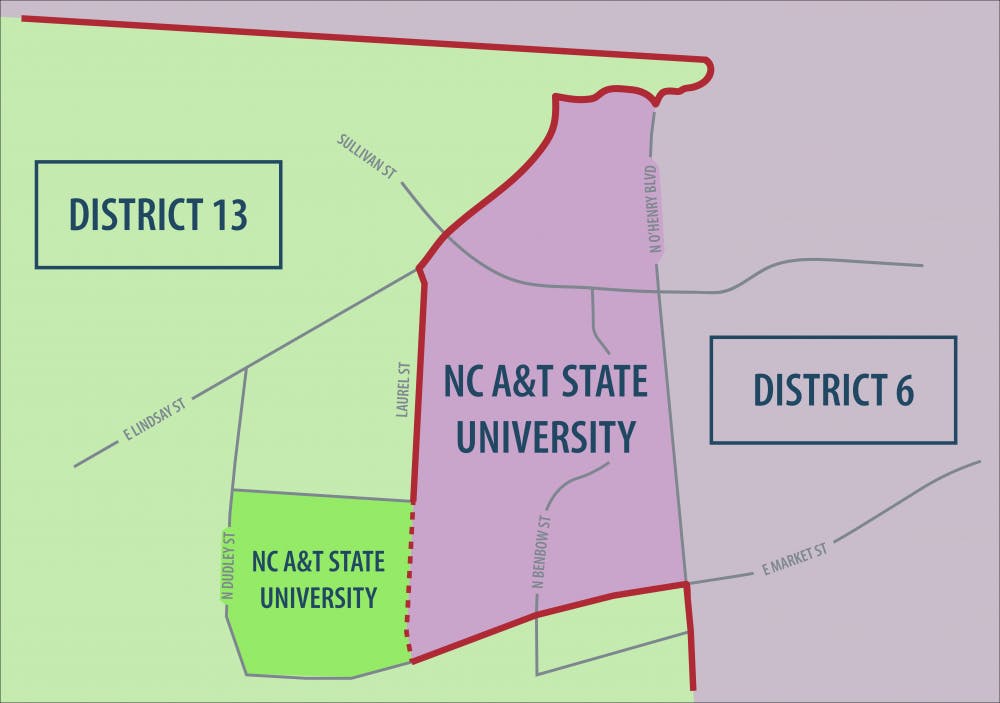“To dilute that and split that amongst two different districts who don’t identify with you at all, is blatant racism and a way to dilute and silence a voice that could be super loud,” he said.
Lewis said in an email the split was not done intentionally.
“Rather, it was simply missed by both Democrats and Republicans when these maps were introduced as we were working on a very short time frame once the courts ordered us to re-draw," he said.
Allison Gilmore, A&T’s student body president, said student activists have shifted the focus of their advocacy from voter turnout initiatives to voter education programs, such as on-campus voter guides with information about candidates’ platforms and potential policy implications, and an A&T Advocacy Day, where student activists will travel to Washington to meet with Walker and Budd.
“The reason why we’re focused on voter education is that if students have something to be attached to, they will be more welcome to voting,” she said.
Langston-Chapman said many student activists had faith that the American government would reform the redistricting process.
“The morale and the way students feel now is going to cause for desperate types of measures and desperate types of organizing because the Supreme Court has now failed us,” he said.
Braxton Brewington, a 2018 graduate of N.C. A&T, said he thinks a lot of people feel frustrated and helpless.
“It just doesn’t seem like anyone really cares that we have democracy in North Carolina,” he said.
What can be done and why it matters
Mitch Kokai, a senior policy analyst at the John Locke Foundation, said the Rucho ruling was fair because all of the ideas the plaintiffs put forward avoided addressing that they were looking for proportional representation in Congress, which is not guaranteed by the U.S. Constitution.
He said the John Locke Foundation believes the state legislature should remove some of the partisanship from the redistricting process, without compulsion from the courts, by establishing firm rules about what information can be used when maps are redrawn.
To get the day's news and headlines in your inbox each morning, sign up for our email newsletters.
“We would like to see good rules in place that would restrict the mapmakers, whomever they are,” Kokai said.
Bob Phillips, the executive director of Common Cause North Carolina, said gerrymandering can lead to extreme policy.
“When you have ideologically pure, driven candidates who emerge in primaries and then have a fake, noncompetitive general election, they have less incentive to ever reach across the aisle and compromise, whether they are congressional votes in D.C. or legislative representatives here in Raleigh, and that’s where you see gridlock and that’s where you see extreme policies passed,” he said.
Brewington said N.C. A&T students have a history of helping spark civil rights movements, citing the Greensboro Four, and that young Black voters have organized and made their voices heard regardless of their representative's party.
“I think that the style of the way that the government is set up, like the system itself, I think it’s something that young Black students at A&T have always been fighting against because it has continuously not worked for students at A&T, and I think that’s evident even in the way that the UNC System operates today,” he said.
Jeff Loperfido, a staff attorney with the Southern Coalition for Social Justice’s voting rights group, said North Carolinians need to be supporting, endorsing and voting for legislators who won’t gerrymander.
“The government’s supposed to be of the people and legislating on behalf of the interest of the people, and when you engage in this cracking and packing, you’re sort of negating some of that direct representation and democracy, the concept of democracy as we understand it,” he said.
Phillips said it is imperative to address partisan gerrymandering quickly because he believes young people are increasingly cynical about democracy.
“We need young people, the next generation of our leaders in this country and in North Carolina, to be engaged and to participate in democracy beyond voting, to understand that voices can make a difference, and that holding elected leaders accountable is vital to a healthy democracy,” he said.
@SLesnewski
city@dailytarheel.com



